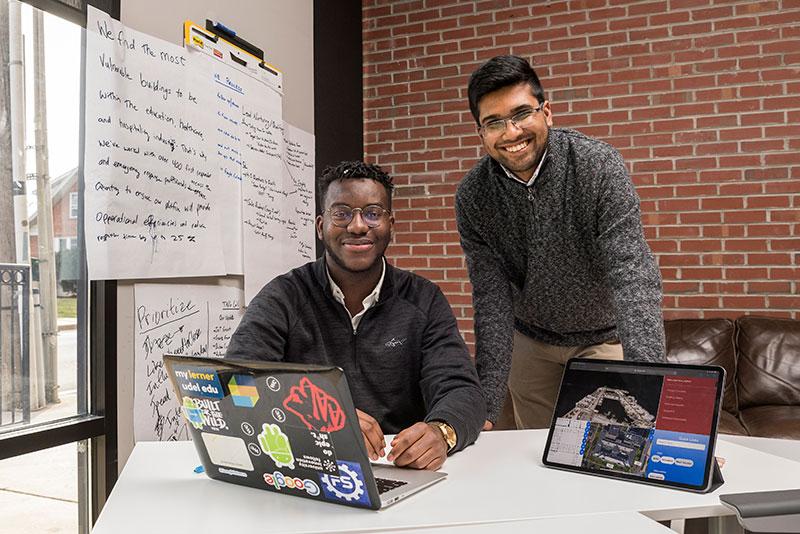Student venture that aids emergency response earns top prize at Tulane Business Model Competition

A technology company whose flagship product is a web-based platform for emergency preparedness took home the grand prize of $75,000 at the 20th annual Tulane Business Model Competition (TBMC).
An annual presentation of the Albert Lepage Center for Entrepreneurship and Innovation at Tulane's A. B. Freeman School of Business, this year's Tulane Business Model Competition attracted a highly competitive pool of 100 student ventures representing more than 50 colleges and universities from across the nation. The top six ventures competed in a semifinal round on Tuesday, March 24, and three finalists faced off on Thursday, March 26 — with the competition occurring, for the very first time, completely online.
The TBMC was originally scheduled to take place as part of New Orleans Entrepreneur Week (NOEW). When NOEW was canceled due to the coronavirus pandemic, the Lepage Center made the decision not to call off the event but instead to reorganize it as a virtual competition, with teams presenting to judges via video conferencing software.
360VR Technology, a company started by students at the University of Delaware, won this year's grand prize for its virtualization and imaging platform, which replaces decades-old building safety and security standards by enabling users to build fully comprehensive models of buildings to assist first responders during emergencies. Buildings have traditionally been managed using binders filled with paper floor plans that are often out of date. Additionally, most building operational information is decentralized — different parties keep different pieces of information and it's often unsharable. Through 360VR's web-based platform, first responders have quick access to critical information in a central location, including a 3D model of the building, enhanced floor plans and a resource locator to find important features such as water lines.
"360VR Technology identified a need in the marketplace that many of us didn’t realize we could benefit from," said Laurie Aronson, president and CEO of Lipsey's, who served as one of this year's judges. "I’m always amazed at the technology that is made available for businesses that could positively impact so many people."
"We cannot begin to describe how happy we are to have won this competition," said Sury Gupta, 360VR's co-founder and CEO. "We are incredibly grateful to Tulane University for continuing this competition virtually for the first time. It was a different experience but one we are very happy that we were able to be a part of."
Relavo, a medical device company founded by students at Johns Hopkins University that addresses shortcomings in home-based treatment systems such as peritoneal dialysis (PD), earned second place and a prize of $30,000. OxyGen, a medical technology company also based at Johns Hopkins, won third place and $20,000 for developing a more efficient portable oxygen concentrator (POC) for patients on ambulatory long term oxygen therapy (LTOT).
"We just experienced an extraordinary afternoon for an extraordinary time judging brilliant teams from Delaware and John Hopkins," said competition judge Albert Lepage, retired chairman of Lepage Bakeries. "The virtual platform presentations, discussions and deliberations surpassed performance expectations. I congratulate the winning team."
In addition to Aronson and Lepage, this year's final-round judges included David Heikkinen, founding partner and CEO of Heikkinen Energy Advisors; Tom Kennedy, former senior executive vice president and CFO of the Hertz Corp.; Rodney Sampson, executive chairman and CEO of Opportunity Hub; and Kurt Tenenbaum, managing director of Owl Rock.
"In the 20 years that we have hosted the Tulane Business Model Competition, there certainly has never been one quite like this one," said Ira Solomon, Freeman School dean. “We knew that there would be tremendous interest given the increased prize money, but this exceeded even our lofty expectations. The two rounds, conducted completely online, were truly inspiring.”
“Entrepreneurship is all about overcoming adversity, especially when faced with unexpected challenges,” added Rob Lalka, executive director of the Lepage Center. “By adapting to the online format, all of these student teams showed grit, perseverance, and focus in ways that were far beyond their years. We were grateful for the willingness of all of our donors, judges, and participants to try something completely new to help students from across the country achieve their entrepreneurial dreams. I’m thrilled with the outcome of this year's TBMC.”
Interested in advancing your education and/or career? Learn more about Freeman’s wide range of graduate and undergraduate programs. Find the right program for you.
Other Related Articles
- Deseret News: Californians are asking, is it time to raise taxes on the rich?
- The Wall Street Journal: For Trump, the Warner Megadeal Talks Are All About CNN
- NBC News: Elon Musk has left the White House, but he hasn't left politics behind on X
- NOLA.com: Louisiana venture capital firms, once an afterthought, are big funders of local startups now
- Forbes: Your Pitch Deck Doesn’t Close the Deal - Your Power in the Room Does
- New Orleans startups bet on AI as Tulane expands its survey statewide in 2026
- Alum launches fund to invest in Tulane-affiliated startups
- Techstrong.ai: Musk Sues OpenAI, Apple For ‘Anticompetitive Scheme’
